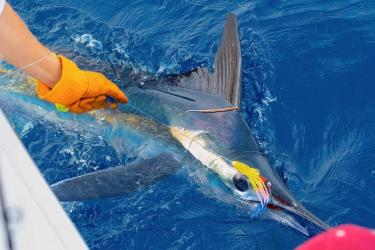As summer came to an end, our interns Hannah Whitaker, Samantha Ward, William Poole, Theany Su, Wyntin Goodman, Kayla Williams, Antonio DeCecco, and Lauren Kittell-Porter looked back on their experiences at the Greater Atlantic Regional Fisheries Office. These eight students from seven universities came to us through three very different paths: Woods Hole Partnership Education Program Second Year, Hollings Undergraduate Scholarships Program, and the Pathways Program. They worked with us for 8 to 10 weeks on a variety of projects covering education, aquaculture, recreational fishing, habitat restoration, and marine mammal conservation.
Outreach and Education
Hannah Whitaker, who studies at the University of North Carolina Wilmington, coordinated educational events for children in summer camp programs and as well outreach to lifelong learners at public events. Pulling together engaging activities, she introduced people of all ages to marine mammals, sea turtles, endangered fish, and more. Hannah's efforts were supported by our other interns as they traveled around Massachusetts and New Hampshire this summer.
At the end of some events, kids would come up and tell me they wished to become marine biologists after doing our activities. Hearing those things makes this whole internship even more valuable to me, said Lauren Kittel-Porter, who, along with many of the other interns, participated in these outreach events.
Samantha Ward, a senior from the University of Rhode Island, worked on our Share the Shore campaign to educate people about sharing coastal areas with seals, how they behave, and how to best avoid altering their behavior. As part of her internship, Samantha created a video Public Service Announcement that we expect to post on our website in the coming months.
William Poole helped develop outreach materials about recreational fisheries issues, mostly focusing on recreational cod fishing. He worked on everything from video proposals to fish-themed word finding activities for kids.
Being a student at the University of Louisville, in land-locked Kentucky, biological knowledge of marine systems and challenges facing marine ecosystems isn't typically covered in great depth in class material. Through my work with my mentors, Moira Kelly and Mark Grant, I learned a lot about fisheries management and policy, said William. On a more personal level, I got to see new parts of the country and explore possible professional futures I hadn't thought much about or even knew existed.

For Theany Su, a senior at Temple University, the summer involved learning how to use power tools and work with PVC piping. Her project involved planning, building, and installing new monofilament line recycling bins at local fishing hotspots. As part of her work, she reached out to local harbormasters and placed two bins in Marblehead and one in Winthrop, with commitments from local groups to collect the material.
Habitat Restoration Planning
Wyntin Goodman, a recent graduate of University of Maryland-Eastern Shore, evaluated candidate coastal sites that could benefit from restoration work. He visited over a dozen sites and conducted literature searches to create a descriptive list of shovel-ready projects that could improve coastal waters if restoration funds become available. Days after he completed his internship, Wyntin's report was used by staff from NOAA, Massachusetts Department of Environmental Protection, and the U.S. Fish and Wildlife Service to further evaluate the project sites for future restoration opportunities.
Threats to Marine Mammals
Two of the greatest threats to marine mammals in our waters are ship strikes and fishing gear interactions. Kayla Williams, a recent graduate of the University of Delaware, worked on a project to help track documented large whale ship strikes in the Northwest Atlantic Ocean. Using GIS, Kayla mapped locations where observed and reported vessel interactions occurred. She compared these locations with seasonal and dynamic management speed reduction areas to help evaluate where and how ship strikes are reported.

Lauren Kittell-Porter, from the University of Rhode Island, took on a fishing gear interaction project. Lauren focused on gathering information on those commercial fisheries known or believed likely to have interactions with marine mammals as well as those that have limited or no interactions. These descriptions will be used by our List of Fisheries program to make sure all fisheries, regardless of interaction rates, are monitored efficiently.
Aquaculture
Antonio De Cecco of Virginia Tech focused his efforts on gathering information about the developing aquaculture industry throughout our region. Antonio created a summary of current production, state management efforts, and existing permitting processes. Based on his research and information compilation, Antonio developed recommendations to continue to streamline state and federal processes and to better assess aquaculture production in our region.
Out Standing in the Field
We didn't just hold these eight dynamic and motivated students captive in our office. The students also took field trips to meet our partners and collaborators, learn about careers in marine and coastal resource management, and better understand the challenges facing New England coastal communities. Among other adventures, the interns sailed on the schooner Ardelle with interns from the Woods Hole Partnership in Education Program, visited Salem State University's aquaculture lab, explored Gloucester's historic working waterfront, went on a seal walk in Provincetown, and visited the Northeast Fisheries Science Center in Woods Hole.
A favorite excursion was a visit to the National Marine Life Center, Bourne, Massachusetts. There, the staff and volunteers allowed the interns to observe the Center's daily routines in caring for rescued seals and sea turtles. The interns witnessed a morning meeting with the clinic's veterinarians, food preparation, feeding, administering of eye drops and ointments, and other medical examinations.

Here in Gloucester, in addition to benefiting from our student's hard work, we were energized by their motivation, curiosity, and engagement. We were reminded of the early days navigating our own marine resource management vocations and our early career explorations. We thoroughly enjoyed hosting our summer interns, and know that their time with us will inform their next steps, and perhaps help them make a difference in the world. Learn more about student opportunities at NOAA on our website.



